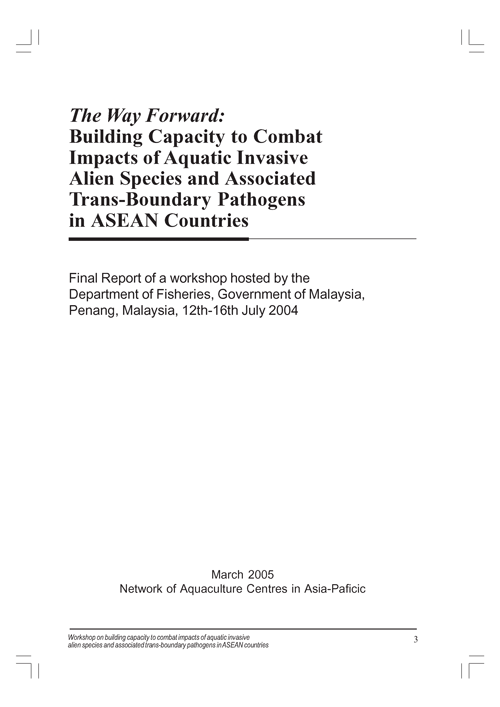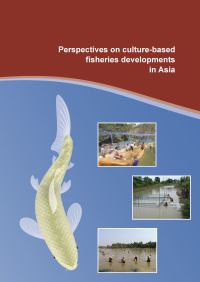Building capacity to combat impacts of aquatic invasive alien species and associated trans-boundary pathogens in ASEAN countries
16 January 2006 | 10090 Downloads | .pdf | 1.54 MB | Australia, Cambodia, Health and Biosecurity, Indonesia, Lao PDR, Malaysia, Myanmar, Ornamentals, Philippines, Thailand, Education and Training, Vietnam
These are the proceedings of the workshop on Building capacity to combat impacts of aquatic invasive alien species and associated trans-boundary pathogens in ASEAN countries, held in Penang, Malaysia, on the 12th-16th July 2004. The workshop was hosted by the Department of Fisheries of the Government of Malaysia and organised by the Network of Aquaculture Centres of Asia- Pacific (NACA) in collaboration with ASEAN, FAO, the WorldFish Center and the United States Department of State.
The 75 participants included delegates from each ASEAN member country, resource persons with experience in aquatic invasive alien species (IAS) and aquatic animal pathogens and representatives of regional and international organisations, research institutes, universities and private sector entities.
The workshop supports the ASEAN 2020 Vision of enhancing “food security and international competitiveness of food, agricultural and forest products and to make ASEAN a leading producer of these products.…” It was convened specifically to better understand the relationship of aquatic IAS and pathogens and their impacts (both positive and negative), and to identify management and capacity building needs to reduce risks.
The workshop built on the recommendations from a 2002 Bangkok workshop organised by the Global Invasive Species Program (GISP) and a 2003 workshop of countries sharing the Mekong watershed, particularly in promoting awareness, establishing coordination mechanisms and information exchange systems and identifying management strategies and risk mitigation measures for aquatic IAS.
Findings
The participants concluded that aquatic IAS and invasive aquatic animal pathogens significantly impact the aquaculture industry in ASEAN, and can have negative implications for aquatic biodiversity, and the social and economic well-being of people in the ASEAN region. Participants also recognised the positive social and economic benefits that have come from the introduction and farming of some alien aquatic species in the region. Participants agreed that the way forward is to minimise the risks and costs associated with negative impacts of aquatic IAS and aquatic animal pathogens whilst capturing the social and economic benefits possible through responsible aquaculture of alien species.
Recommendations
Four working groups prepared detailed action plans to assess and manage the impacts and risks from aquatic IAS and associated animal pathogens. The following bullets highlight the main recommendations agreed upon by the workshop participants as the way forward:
- Management of aquatic IAS and associated pathogens is imperative and should be encouraged and implemented in all ASEAN countries.
- National strategies should be developed consistent with obligations under existing international treaties and instruments1 and in harmony with strategies for other IAS, including aquatic plants and ornamental fish. National strategies, coordinated through national focal points, should be based on impact assessment and management of alien species, where they are already established, and use of ecological and environmental risk analysis for proposed new introductions.
- National strategies should be implemented within a legitimate regional framework supported and endorsed by ASEAN. The recommendations in this Way Forward summary should be presented to the ASEAN Secretariat as a starting point for coordinated regional action, through the ASEAN Sectoral Working Group on Fisheries and other appropriate bodies.
- ASEAN member countries should have the necessary institutional and human resources to adopt a harmonised regional strategy. Bridging development gaps and capacity building across member countries is therefore necessary. Special attention should be given to capacity building among the Mekong basin countries of Cambodia, Lao PDR, Myanmar and Vietnam.
- In-country IAS impact assessment and risk analysis training should be promoted and implemented to establish core expertise in these practices in all ASEAN countries. Experiences in risk analysis and impact assessment should be shared among ASEAN countries.
- Networking, information exchange and cooperation among concerned agencies, industry, trading partners and countries sharing common watersheds or waterways is recommended for cost-effective use of resources in support of ASEAN in achieving the goal of effective management of aquatic IAS and associated aquatic animal pathogens.
- Assistance should be sought from regional and international organisations to implement the workshop recommendations, including from the organisers and participants of this workshop and other regional and international organisations. Progress in implementing the workshop recommendations should be assessed in three years.
Creative Commons Attribution.

